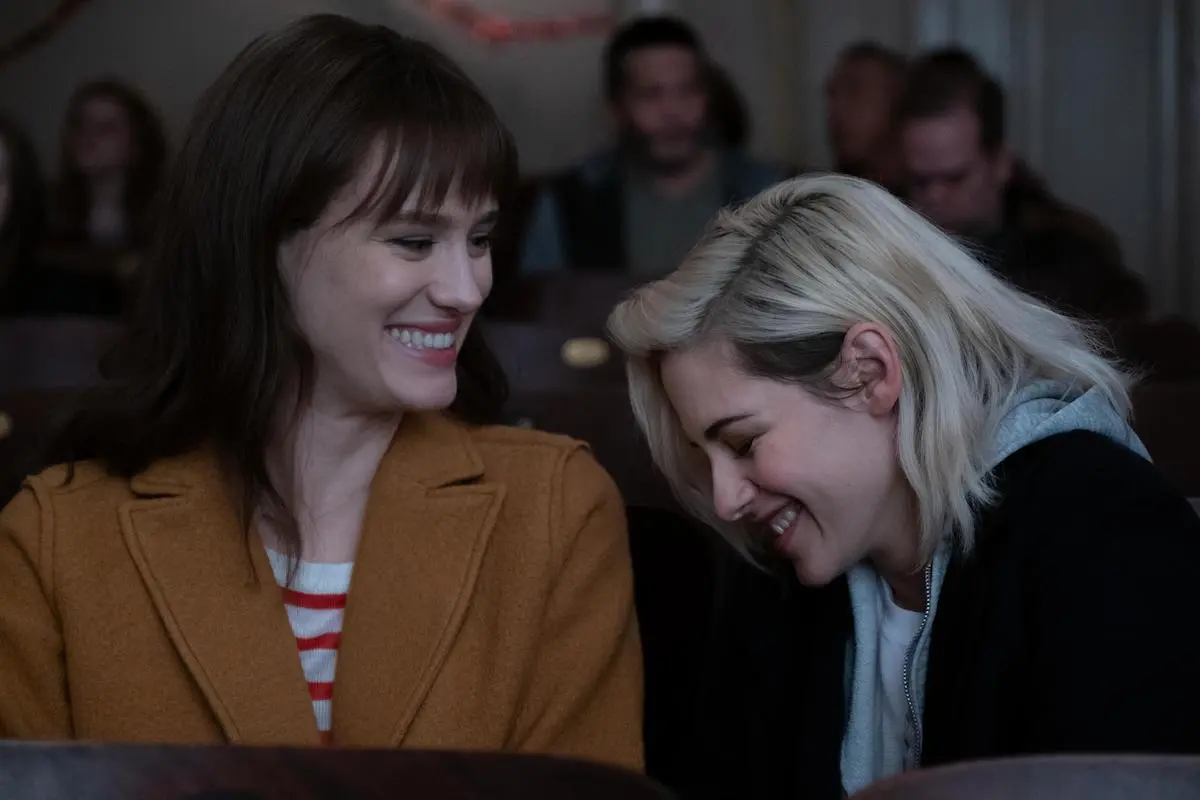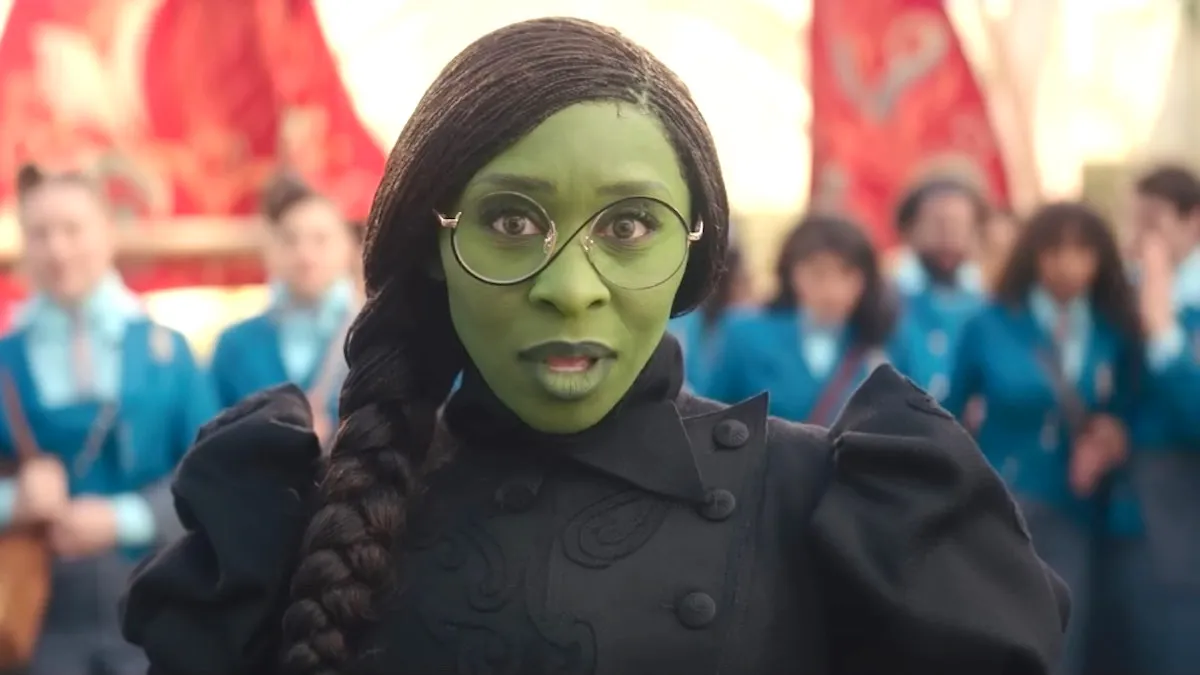Clea DuVall knows that we all thought Mackenzie Davis’s character, Harper, was the worst in Happiest Season, and she’s taking it in stride. And when I say “we all” I mean all, since Happiest Season has rocketed up the streaming charts to become Hulu’s most-watched movie debut. Discussing the film this week with Huff Post, DuVall went into the very loud criticism of Harper and why she and writer co-writer Mary Holland picked a “happy ending” that didn’t make a lot of the audience happy.
Firstly, DuVall addressed the support for Abby (Kristen Stewart) and fan-favorite Riley (Aubrey Plaza) as a couple and why she didn’t go there.
Well, I think it’s really fun that it is a talking point and that people are having debates. It’s really cool, I think, but something that was really important to me personally was showing a friendship between two queer women. I feel like so much of the time when you see two queer women onscreen — usually because they’re the only ones — it’s like, “Well, you have to end up together because there’s no one else.” But also the relationships in my life with other queer women are so special and so important to me, and I think showcasing that and watching two women have an intimate connection that doesn’t need to be romantic is really important because it is such an important part of our community.
I definitely agree with this and I do love that there were more than two queer characters in Happiest Season. I liked that Abby (Kristen Stewart) and Riley (Aubrey Plaza) connected as friends, and I don’t want to impose the standard on them that any two people who could potentially be sexually attracted to one another should end up together on a queer female friendship. I don’t like the idea that if a straight man and a woman share a pencil they should get married, so I don’t want to do that here.
But … the thing is, Harper (Mackenzie Davis) was terrible and Riley was not, and Riley had much more chemistry with Abby than Harper did! Abby deserved much better than Harper, who we were never given any reason to really like. When it comes to why Abby forgave Harper and they ended the film together, DuVall was pretty clear on her reasoning why.
We always wanted there to be a happy ending for Abby and Harper. It was very important at the end of the journey for it to be a success, to have just a straight-up happy ending because I think LGBTQ films are riddled with bittersweet endings. That’s all I can think of when I think of queer movies. The last truly happy ending I can think of is But I’m a Cheerleader, and that was 20 years ago.
Now, I haven’t seen every lesbian film of the last 20 years, but that’s just not true. Even in just a decade after But I’m A Cheerleader, we got happy queer endings for women in movies like Imagine Me and You and Gray Matters, and more recently even movies like Carol have had more positive queer endings. And let’s not forget how television has changed since then as well. So that’s not an excuse that I really buy and it feels somewhat disingenuous to ignore so many movies to talk up yours.
DuVall also has some forgiveness for Harper and it seems like she wanted us to like her much more than we did.
And especially with Harper, we’re meeting her on the worst four days of her life, where she’s hitting bottom and we are watching it, and that is messy and that is uncomfortable. Then, at the end of that, she can come out the other side of it and make a different choice and use it as an opportunity to grow and better herself. She is redeemed. She deserves to be forgiven. She deserves to be loved, and she’s willing to do the work to get it back. Even though the movie ends in a happy way and we cut to a year later, what I always envision is the time in between when they’re really dealing with that, because it’s not like they come home and they get engaged right away. It’s 10 months later that they get engaged. A lot of work is done.
And again, I agree somewhat, but I think the problem with Happiest Season and getting us to root for Harper was the film didn’t work hard enough to make us like Harper before she started being an asshole and forcing Abby into the closet. The interview makes the point that Abby is really the main character who is forced to “code switch” and that makes me pause because, well, this is a RomCom with two leads—and just one of them is a jerk.
Of course, there are some reasons Harper is a jerk, according to DuVall:
Self-loathing and internalized homophobia is a very real thing. I have definitely wrestled with it, and so many people I know have wrestled with acting out at other people because you don’t want to be found out. You feel like there’s something fundamentally wrong with you, and you will do anything you can to deny it. I think there are a lot of awful things that come out of that, and self-love is sometimes so hard to achieve. Yeah, it is messy, and she does do things that are unlikable, but she is a good person who is in a place of extreme fear, and [it’s important] to not gloss over that. Especially someone who was 16 years old going through that.
And once again, these are good points or they would have been good if the movie was set in 2004. DuVall, like many queer people, grew up and into her sexuality at a time that was very different from now when there was much more shame and fear. And that’s not to say that there isn’t homophobia now, but there’s still much more acceptance. I felt when watching Happiest Season that it seemed like a relic of another era, and like a film that was exorcising some very old demons.
Overall, I enjoyed Happiest Season because it was a fun Christmas movie that was as gay as my own life, though way more dramatic. But I do wish it had been made with a more up-to-date perspective and showed more of a willingness to find a different happy ending.
(image: Hulu)
Want more stories like this? Become a subscriber and support the site!
—The Mary Sue has a strict comment policy that forbids, but is not limited to, personal insults toward anyone, hate speech, and trolling.—










Published: Dec 3, 2020 03:27 pm